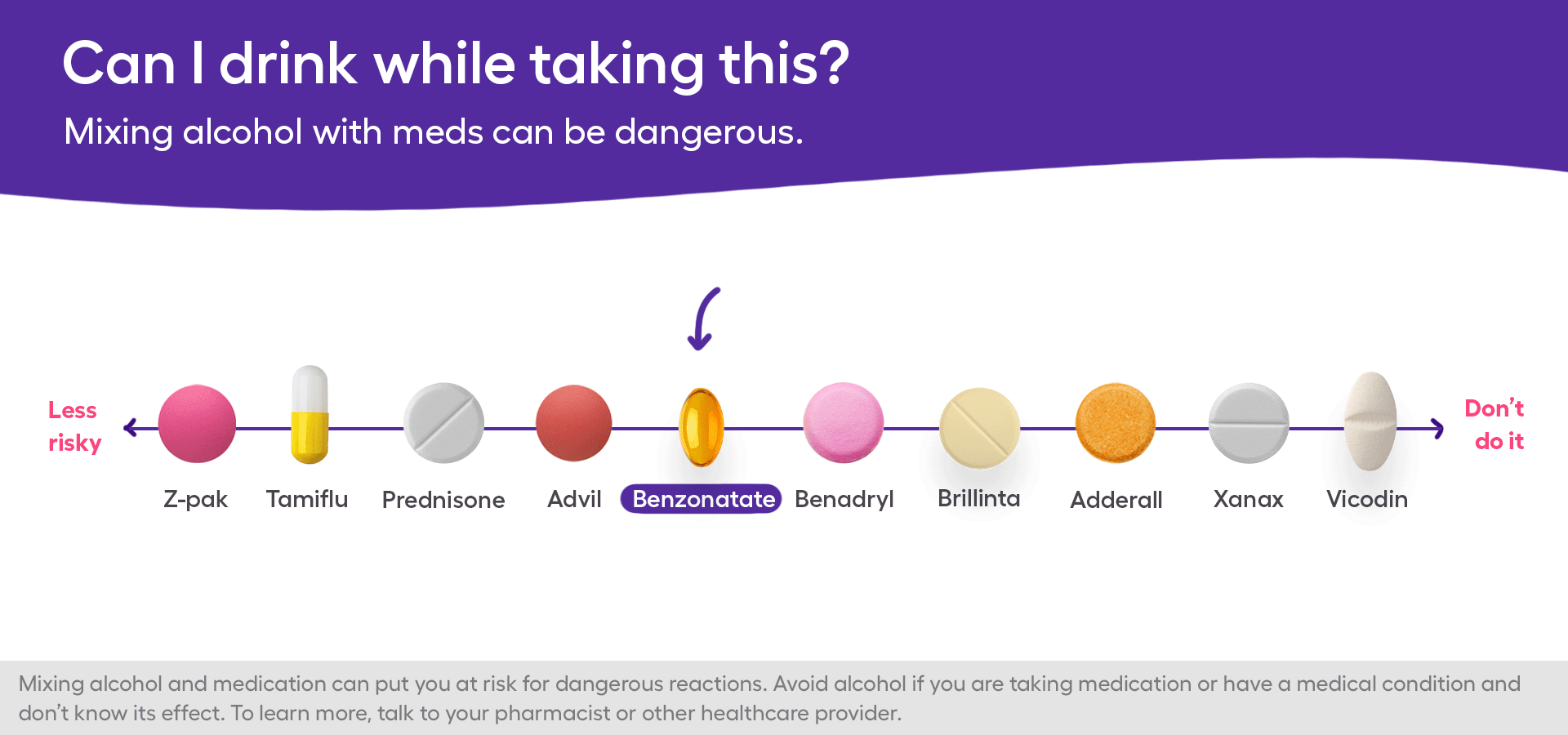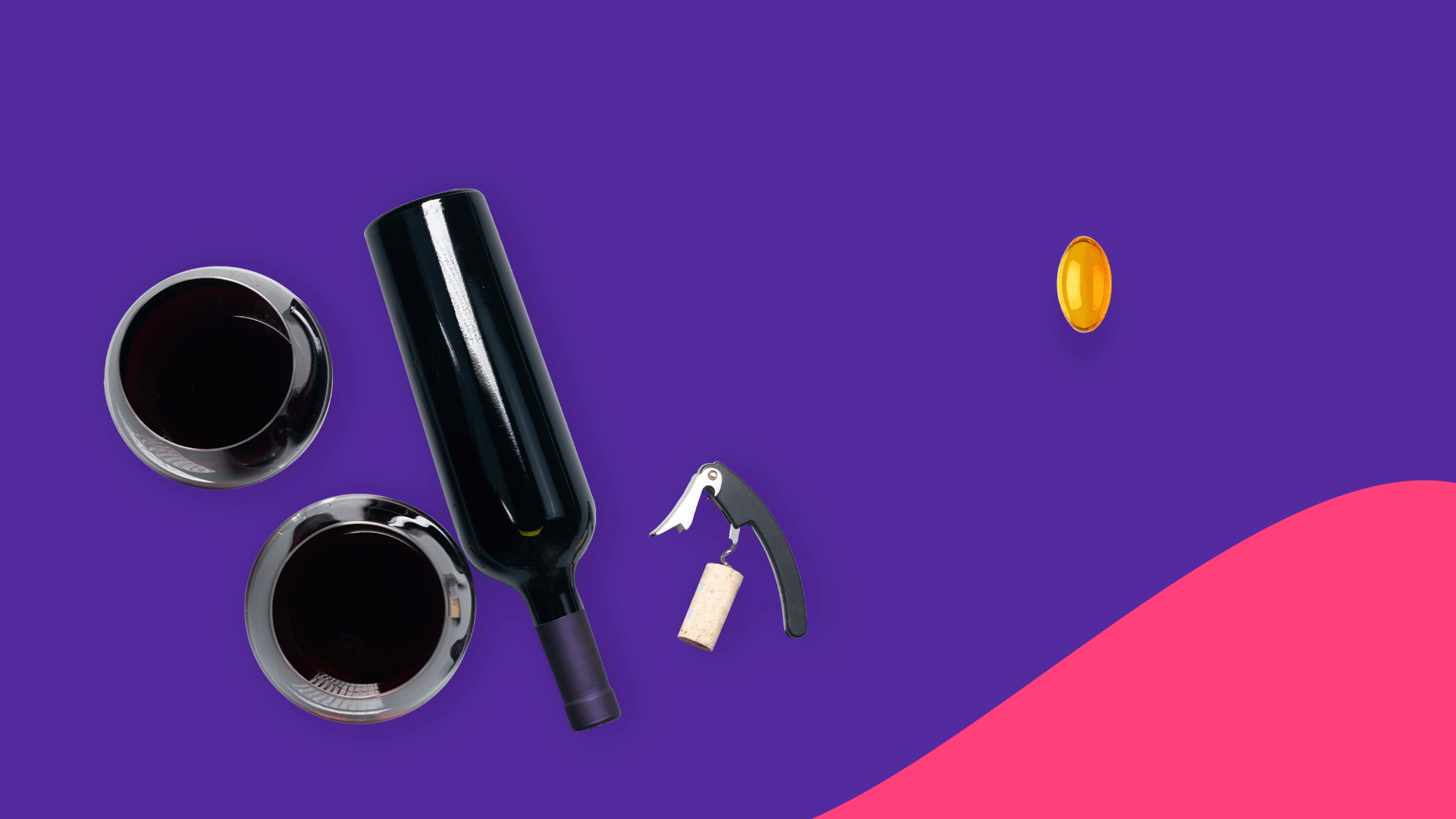Key takeaways
Mixing alcohol and benzonatate can increase the risk of side effects, particularly on the central nervous and gastrointestinal systems.
While moderate drinking might not cause concern when taking benzonatate, consulting a healthcare provider is advised to ensure safety.
Alcohol and benzonatate both have sedative effects; combining them can lead to increased drowsiness and potentially amplify other side effects.
Heavy alcohol consumption can impair the immune system, potentially worsening the conditions benzonatate is prescribed to treat, such as coughs from colds or lung conditions.
You may be prescribed benzonatate, also known by its brand name Tessalon Perles, if you’re dealing with a persistent cough—whether it be from the common cold or a lung condition like bronchitis or asthma. As a commonly prescribed antitussive, benzonatate can help relieve a short-term, dry cough by reducing the cough reflex.
If you’re sick, you might also be looking for other remedies to relieve your symptoms, such as over-the-counter medications or even alcohol. Old wives’ tales suggest that alcohol, especially whiskey in a hot toddy, could help relieve cold symptoms. There may be some truth to the benefits of alcohol for pain from a sore throat, for example. But you should probably hold off on drinking alcohol if you’re also taking benzonatate. Continue reading to learn more about the effects of mixing alcohol and benzonatate.
Can you take benzonatate and drink alcohol?
The official FDA label for Tessalon Perles, the brand name of benzonatate, does not list any drug interaction involving alcohol. However, that doesn’t mean it’s safe to mix alcohol and benzonatate capsules. The effects of mixing alcohol and benzonatate can vary depending on different factors, such as the amount of alcohol consumed and the dosage of benzonatate prescribed.
Drinking alcohol in moderation is unlikely to be a cause for concern while taking benzonatate in normally prescribed doses. However, you should always consult a healthcare provider for medical help if you’re unsure whether it’s safe to mix any substances, including other drugs or alcohol, with benzonatate.
Benzonatate and alcohol side effects
Both benzonatate and alcohol can have effects on the central nervous system (CNS). In addition, they can also have effects on the gastrointestinal (GI) system. Mixing alcohol and benzonatate may lead to an increased risk of side effects from alcohol and benzonatate.
The most common side effects of benzonatate
Benzonatate may cause various side effects, but the most common side effects include:
- Sedation
- Headache
- Dizziness
- Itching
- Skin rash
- Constipation
- Nausea
- Upset stomach
- Chest numbness
- Stuffy nose
- Chills
- Irritation or burning in the eyes
- Confusion
- Visual hallucinations
Serious side effects of benzonatate
When benzonatate is taken as prescribed, serious side effects are rare. Benzonatate’s most serious side effects include allergic reactions, which can be triggered by sucking or chewing the capsule instead of swallowing it. Sucking or chewing a benzonatate capsule can cause the active ingredients to release into the mouth and throat. Signs and symptoms of an allergic or hypersensitivity reaction to benzonatate include:
- Anaphylaxis, which can be indicated by skin rash, difficulty breathing, and a dangerous drop in blood pressure
- Bronchospasm, or constriction of the airways
- Laryngospasm, or constriction of the vocal cords
Allergic reactions to benzonatate can be life-threatening. Seek immediate medical attention if you experience an allergic reaction to benzonatate.
Other serious side effects of benzonatate
Other serious side effects of benzonatate may include choking, difficulty breathing, and death, especially with accidental ingestion in children. An overdose of benzonatate can also lead to serious side effects, such as tremors, restlessness, and seizures. Within one hour of ingestion of an overdose of benzonatate, reported side effects have included:
- Swelling in the brain (cerebral edema)
- Sudden loss of heart function (cardiac arrest)
- Coma
The overlapping effects of alcohol and benzonatate
Alcohol can cause CNS side effects similar to those of benzonatate, especially sedation or drowsiness. Drinking alcohol with benzonatate may lead to increased sedation.
In rare cases, drinking alcohol can cause mental side effects, such as confusion or hallucinations. Mental side effects from alcohol are typically associated with heavy drinking, especially in people with alcohol use disorder. People who abuse alcohol may be at an increased risk of mental health effects, and adding benzonatate to the equation may amplify the risk of these effects.
Side effects of benzonatate are typically more pronounced in higher dosages. However, if you experience these CNS side effects while taking benzonatate as prescribed, you should avoid drinking any alcohol with benzonatate.
Drinking alcohol can also cause nausea and an upset stomach, which are possible side effects of benzonatate. Mixing alcohol and benzonatate could increase the risk of experiencing GI side effects from benzonatate. 
Alcohol and other antitussives
Dextromethorphan is another antitussive or cough suppressant that is widely available over the counter (OTC). It can also cause CNS depressant effects, much like alcohol. Mixing alcohol and dextromethorphan could lead to increased CNS side effects, such as drowsiness.
Cough medicines, in general, may also contain other drugs, such as antihistamines or opioids. Some cough syrups may contain an antihistamine, such as promethazine or diphenhydramine, or an opioid, such as codeine. Although they may help relieve a pesky cough, cough medicines commonly cause CNS side effects, such as drowsiness and dizziness.
It is not recommended to mix alcohol with antitussives due to a potentially increased risk of drowsiness. In severe cases, mixing alcohol with potent cough medicines could lead to slowed breathing (respiratory depression), severe dizziness, or coma.
Alcohol’s effects on the immune system
If you’re taking benzonatate because you’re sick, you probably won’t be feeling in the mood for a night of drinking anyway. In most cases, you’ll want to take it easy and rest until you recover from your cough. After all, your body needs all the support it can get to fight an infection and recover properly. That means avoiding substances, such as alcohol, that may interfere with your body’s immune system.
Research suggests that alcohol can have different effects on the immune system. Moderate alcohol consumption may have positive effects on inflammation and the immune system. However, binge drinking for a night or drinking heavily on a regular basis has been shown to impair the functions of the immune system.
Studies have also shown that people who abuse alcohol are more likely to develop serious lung conditions, including tuberculosis, respiratory syncytial virus (RSV) infection, and pneumonia. An increased risk of lung problems may be due to an impaired immune cell response caused by chronic alcohol use.
Heavy alcohol consumption can also impair the function of the lung cilia, the hair-like projections that help sweep viruses, bacteria, and other micro-debris out of the lungs. Drinking alcohol in large amounts could have negative effects on the outcomes of lung conditions, such as COPD and asthma.
RELATED: Alcohol statistics
Avoid alcohol with the common cold
If you’re dealing with the common cold, you may be feeling congested with a stuffy nose. Alcoholic drinks can trigger allergic-like symptoms, such as a stuffy nose, headache, and cough. While the severity of symptoms can vary based on the type of alcoholic drink consumed, it’s possible for alcohol to worsen your cold symptoms. Wine, in particular, contains histamines that can trigger a stuffy nose, headache, and worsened asthma symptoms.
A 2005 study investigated alcohol’s effect on the upper airways and nasal passages. Alcohol-induced nasal symptoms (ANS) include sneezing, nasal discharge, and nasal blockage. Almost 12,000 people with lung diseases participated in the study survey. It was found that a diagnosis of asthma, chronic bronchitis, COPD, or allergic rhinitis was linked to experiencing ANS.
Some alcoholic beverages may also promote dehydration, which could worsen cold symptoms. Staying hydrated is one of the most important things you can do to ensure your body is functioning properly and working well enough to fight an infection. If you want to get better as quickly as possible, you’ll want to avoid drinking alcohol while you’re sick.
Bottom line
Drinking alcohol in moderation while taking benzonatate is not likely to cause serious harm. However, to be on the safe side, you may want to avoid drinking alcohol if you’re sick and taking an antitussive.
Mixing large amounts of alcohol with a high dosage of benzonatate can increase the risk of serious side effects. You may feel more drowsy, dizzy, or nauseous if you drink alcohol with benzonatate. If you’re feeling sick with a cough, you’ll want to avoid alcohol anyway to ensure your immune system works at its best.
Always consult a healthcare provider for medical advice before starting treatment with a new drug. Before taking benzonatate, you should tell your healthcare provider about any medical conditions and other meds you’re taking, including prescription drugs, OTC medicines, and herbal supplements.




